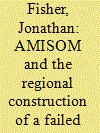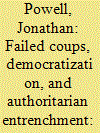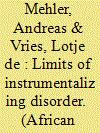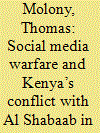|
|
|
Sort Order |
|
|
|
Items / Page
|
|
|
|
|
|
|
| Srl | Item |
| 1 |
ID:
165974


|
|
|
|
|
| Summary/Abstract |
Somalia, for many analysts, is the paradigmatic ‘failed state’, as well as the site of numerous external interventions since 1991. However, while early interventions were designed and directed by international actors, more recent peace operations have been led by regional states. The current African Union Mission in Somalia, AMISOM, has been presented by its supporters and financiers as a novel ‘African solution’ to a putative ‘African problem’. This article seeks to challenge analyses of AMISOM and other African peace operations that contrast ‘international’ approaches with ‘local’ or ‘African’ approaches, focusing instead on the region as a unit of analysis. In doing so, the study uses archival and interview data to interrogate how regional politico-military elites have viewed Somalia, their role within it and the kind of political authority they have wished to see established there since the genesis of AMISOM. The article finds that regional elites have sought to use AMISOM to impose a particular version of statehood on Somalia, based in both neo-Weberian institutionalist theory and their own domestic political experiences. This has entailed not only the rejection of central manifestations of Somali political authority but also the regional construction of Somalia itself as a failed state.
|
|
|
|
|
|
|
|
|
|
|
|
|
|
|
|
| 2 |
ID:
165972


|
|
|
|
|
| Summary/Abstract |
Long maligned as the largest threat to democratization, recent studies have suggested that military coups can act as important windows of opportunity for democratization in authoritarian regimes. It is argued that even failed coup attempts can roughly double the probability that an authoritarian regime democratizes in the next three years. We revisit these findings by assessing each case of a democratic transition occurring in a failed coup spell in Africa, using the standards of prior work. Our analysis points to a more pessimistic view of the influence of failed coups. Specifically, we find that the nature of these transitions, often being drawn out over several years, and the nature of the data previously utilized to test the association undermine the ability to observe a democratizing effect. Instead of failed coups providing a significant boost to democratization, we find they are more likely to reinforce the country’s previous political trajectory. Failed coups serve incumbents with the dual benefit of both outing their opponents and providing a pretext for their removal, ultimately providing a policy boost for both democrats and autocrats.
|
|
|
|
|
|
|
|
|
|
|
|
|
|
|
|
| 3 |
ID:
165973


|
|
|
|
|
| Summary/Abstract |
In low-income countries, citizens often pay ‘taxes’ that differ substantially from what is required by statute. These non-statutory taxes are central to financing both local public goods and maintaining informal governance institutions. This study captures the incidence of informal taxation and taxpayer perspectives on these payments. We find, first, that informal taxes are a prevalent reality within areas of weak formal statehood in Sierra Leone, with households paying an equal number of informal and formal taxes. Second, we find positive taxpayer perceptions of the fairness of informal taxes relative to formal taxes, despite informal taxes being regressive in their distribution. We explain this by the fact that taxpayers are more likely to trust the actor levying these payments and are more likely to believe that they will be used to deliver benefits to the community.
|
|
|
|
|
|
|
|
|
|
|
|
|
|
|
|
| 4 |
ID:
165971


|
|
|
|
|
| Summary/Abstract |
Much of the promise of the good governance agenda in African countries since the 1990s rested on reforms aimed at ‘getting the institutions right’, sometimes by creating regulatory agencies that would be above the fray of partisan politics. Such ‘institutional fix’ strategies are often frustrated because the new institutions themselves are embedded in existing state structures and power relations. The article argues that implementing Kenya’s land law reforms in the 2012–2016 period illustrates this dynamic. In Kenya, democratic structures and the 2010 constitutional devolution of power to county governments created a complex institutional playing field, the contours of which shaped the course of reform. Diverse actors in both administrative and representative institutions of the state, at both the national and county levels, were empowered as ‘veto players’ whose consent and cooperation was required to realize the reform mandate. An analysis of land administration reform in eight Kenyan counties shows how veto players were able to slow or curtail the implementation of the new land laws. Theories of African politics that focus on informal power networks and state incapacity may miss the extent to which formal state structures and the actors empowered within them can shape the course of reform, either by thwarting the reformist thrust of new laws or by trying to harness their reformist potential.
|
|
|
|
|
|
|
|
|
|
|
|
|
|
|
|
| 5 |
ID:
165975


|
|
|
|
|
| Summary/Abstract |
Assumptions about the political economy of African states predominantly centre on a dominant elite’s ability to stabilize power. A key assertion is that elites maintain clientelistic networks of rents and redistribution and in turn extend their control over their respective territories by instrumentalizing disorder. We challenge the assumption that disorder plays such a functional role. Largely drawing on data and fieldwork from the Central African Republic, we demonstrate the profoundly unproductive consequences of disorder that tend to be overlooked through current approaches to the political economy of African countries. We investigate how disorder impacts three dimensions of effective politics of domination: a set of elite groups that structure power in society, a political economy that redistributes its benefits through formal and informal networks, and the existence of functional centre–periphery ties across a territory. The article shows with regard to the Central African Republic that disorder has produced a small political elite that is largely unable to stabilize its power basis. We argue that certain African states are subject to forms of disorder that political elites cannot turn into an advantage.
|
|
|
|
|
|
|
|
|
|
|
|
|
|
|
|
| 6 |
ID:
165979


|
|
|
| 7 |
ID:
165977


|
|
|
|
|
| Summary/Abstract |
Much of the recent literature on rebel governance and violent political orders works with ‘centred’ and instrumental understandings of power. In this view, power is seen as exercised over subjects, and as situated in rebel rulers, governance institutions, or ruling networks. Drawing on the study of the armed groups known as ‘Mai-Mai’ in eastern Democratic Republic of the Congo, this article instead adopts a governmentality perspective on rebel governance. It demonstrates how Mai-Mai groups rule not only through direct imposition but also, more subtly, by shaping people’s subjectivities and self-conduct. We identify four clusters of techniques of Mai-Mai rule that relate respectively to ethnicity and custom; spirituality; ‘stateness’; and patronage and protection. We argue that a governmentality perspective, with its focus on rationalities and practices of power, offers a fine-grained understanding of rebel rule that moves beyond common binaries such as coercion versus freedom. By showing its relevance for the analysis of rebel rule in the eastern Congo, our findings further strengthen the case for applying a governmentality perspective to non-Western political orders.
|
|
|
|
|
|
|
|
|
|
|
|
|
|
|
|
| 8 |
ID:
165976


|
|
|
|
|
| Summary/Abstract |
This article explores Kenyan citizens’ right to know details about sensitive security-related information in the context of a new era of social media warfare. It considers the public communications response to Al Shabaab’s January 2016 attack on Kenya Defence Forces (KDF) personnel in El Adde, Somalia, and then to a similar attack in Kulbiyow a year later. Drawing on Twitter posts, an official account of Kenya’s military activities in Somalia, and – unusually for the study of social media – on ‘offline’ methods of qualitative data collection, it asks why the KDF did not provide real-time updates about the El Adde attack, but did provide information about the assault on Kulbiyow? Three plausible explanations for the KDF’s differing response are considered. First, at the time of El Adde, the KDF was inexperienced in terms of social media communication. Second, El Adde taught the KDF that in order not to lose the all-important public opinion, it had to match its enemy and also disseminate credible information. Finally, the strengthening voice of Kenyan citizens and the potential for further reputational damage pushed the KDF from a ‘need-to-know’ frame of mind in terms of its sharing of information, to more of a ‘right-to-know’ mentality.
|
|
|
|
|
|
|
|
|
|
|
|
|
|
|
|
| 9 |
ID:
165978


|
|
|
|
|
| Summary/Abstract |
Social network approaches have much to offer for the study of African politics. This research note explores the tensions and benefits of using social networks as metaphor or as method, and highlights the types of questions network research can address. We discuss sources of network data, key features of the graphical perspective and basic vocabulary, and the difference between analyzing individual networks and full systems. Three social network analysis (SNA) concepts—centrality, brokerage, and multilevel networks—indicate theoretic spaces for qualitative and quantitative synergies. The note also raises practical considerations and ethical challenges for conducting network research in fieldwork settings, drawing on a collaborative project in eastern Democratic Republic of the Congo. In conclusion, we encourage layering disciplines and mixing methods to more fully understand how networks shape social life in Africa.
|
|
|
|
|
|
|
|
|
|
|
|
|
|
|
|
|
|
|
|
|